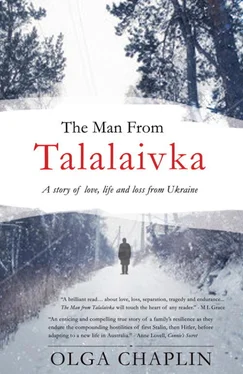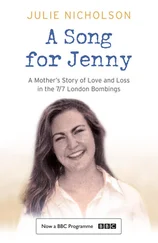Peter’s stomach suddenly wrenched. He felt a clamminess, a sickening wave of nausea running through him. Instinctively he turned to one side, trying to contain a need to vomit, the shock hitting him hard. He felt as if someone had punched the very life out of him. Sweat pricked painfully at his forehead, at his body. He leaned against the damp cell wall, his eyes trying to focus on his brave parents; breathed deeply, slowly, willing himself to remain collected. More than at any other time, his parents needed his support, his clear thinking.
He knew what this meant. For Yosep and Palasha, it was a sentence to a prolonged death.
The guard shuffled his boots, edging to his final command for Peter to leave. “Dobreye cholovik,” Peter appeased the shifty militia soldier. “Give me one more minute… please… to farewell my close ones.”
He turned to his parents, standing forlorn in their crushed garb, yet somehow dignified in this dank cell. “Peta…” his father beseeched him. “Don’t burden your heart any more, son. We will live as we must, as long as God wills us. Peta, we want you to look ahead… to your happiness… Protect Vanya… Do what you must, son. You need to take a wife, be a family once more. It will ease our hearts, to know you and Vanya are not suffering.”
Peter nodded in acceptance, moist eyes concealed in the dimness. His parents, always so fair and selfless were now, in the midst of their own suffering, giving him their blessing to seek his own peace. He yearned to comfort them. But he knew he could do no more.
“I understand,” he whispered, almost to himself, “what has to be, so it will be.”
He felt their tears as they embraced him one last time. The guard’s impatient boots crunched the worn stone floor, rifle butt scraping his heavy uniform buckle. Peter looked back one last time, his parents’ visages motionless in the dusky light. He would plead for his parents, whatever the risk. The NKVD men might yet be swayed by his usefulness to this new Stalinist regime, by his experience as veterinary practitioner. He had heard of reprieves, of some softening in sentences for inexplicable reasons.
But, deep within, cold reasoning told him it would be futile. His parents were not Bolshevik Party members. They were of no consequence to Stalin or his cohorts of the new dogma. If anything, this new so-called troika regime gained perverse pleasure and thrived on stripping them from their farm, from their Oblast, from their Ukrainian heritage. Little wonder the very word ‘kulak’ had become an infamous instrument of propaganda for Stalin and his bureaucracy who, like a pack of howling wolves, tore increasingly faster through their prey, leaving misery and death in their wake. Peter knew his parents’ fate was sealed. He had yet to see what his would ultimately be.

Chapter 7
Stasyia lovingly adjusted the long, embroidered cloth framing the miniature icon of holy Mother and Child and passed her eye over the makeshift altar. It was devoid of its ecclesiastic artefacts, but the simple roses and cornflowers at table’s end exuded a tranquil beauty as they picked up the sun’s rays from the nearby window. She took a deep breath of satisfaction. “Praise be to our Lord,” she murmured. She was pleased her part in this union, despite almost overwhelming difficulties, had been received so well. “Give us all strength to live good and long lives,” she prayed silently to her Maker. Every moment was precious, in these uncertain times. Crossing herself, she bowed low before the altar table and kissed its fine linen cloth as if the icon of the Lord were still in its honoured place; then, straightening and smiling warmly to the wedding party, she motioned them to the hallowed setting. “Drastysa, Petro, i dorohi; drastysa, Evdokia, i dorohi,” she welcomed them, and awaited Father Chernyiuk as he blessed the families in the ‘collective’ farmhouse. She fondly observed him, pleased with his neat appearance. His shabby black cassock had withstood her careful handling in the cold spring water and even evinced a new respectability before this scented altar.
Peter stood taller, more confident, head held proudly high before the priest. He glanced quickly at Evdokia, smiled at her pensive face. “So calm,” he thought, “… so far away.” She seemed removed, almost unattainable, her emotions hidden beneath her short lace veil. He breathed in her honeyed scent complementing the delicate perfume of flowers woven in her braided hair. The wafts of summer’s blooms mingled with the reassuring hint of incense as the priest took out his precious gold-embroidered ecclesiastical ribbon and kissed it, as the nuptials began.
Peter drew a deep breath, turning his mind from the painful events of the past months and of his last visit to his imprisoned parents. This was a time for living, for new commitment, for some joy. There could be no more room in his mind for doubts or regrets; no more room in his heart for sorrow, for what could have been. Only room for a future, for healing, for affection and love to grow.
As Stasyia gently bound their hands with the fine gold ribbon in the symbolic joining of two souls in marriage, Evdokia could feel Peter’s pulsating warmth envelop her. She tilted her head slightly and smiled gently beneath her veil, her seeming remoteness broken. They moved in unison, slowly, Ivan and Fedir’s unadorned crowns of wildflowers held high above them, and Father Chernyiuk guiding them in their first steps as man and wife.
Stasyia carefully unpinned the square of lace shielding Evdokia’s face. They crossed themselves and kissed the priest’s upheld cross. “Go forward, good man and wife,” he beseeched them. “Keep to each other in this life. Live your lives according to our Lord’s ideals.” He crossed himself and held up his cross in a final blessing for the attendants to acknowledge, then carefully folded his gold ribbon and hid his precious relics deep in his cassock.
“Well, now,” he smiled, old eyes brightening, “let us have our celebratory drink, share our meal and be glad for this day!” His eyes rested on Peter. “Let us also pray for our loved ones who cannot share this day with us. Pray for their safety… for their good health. We must be strong for them.”
As their wedding dinner progressed, Hresha stepped forward and embraced his older brother. “Oi, Petro!” he called out, teasingly. “Look what I’ve brought for the celebration! This’ll keep us on our toes, once the grape wine runs out and the samohon is on the table!” He held up Peter’s old balalaika. Peter grinned and eyed him mock-threateningly, but pleased nonetheless with the promise of frivolity. It was time for celebration, not for mourning or despair. There had been enough time for those in the past; there would be time enough, again, for that in the future. Today was for living, for savouring the good moments.
He looked affectionately at Evdokia as she blushed politely and received congratulatory embraces and jovial comments from his brothers. His heart filled with pride at her composure, her courteous manner and warm response to his family who, until now, knew her so briefly. “I am truly fortunate,” he thought to himself. He realised there were no guarantees in this life but he intuitively sensed Evdokia would have in her the qualities, the strength of character, that would sustain them in the life they would share from this day. He sighed to himself. He desperately needed time to be alone with his new wife. He looked ahead to them sharing quiet moments, and to adjusting to each other’s ways. “And Vanya will be glad to be with her,” he surmised thoughtfully. “She takes her duties seriously… he will find in her a warm and caring mother.”
Читать дальше













